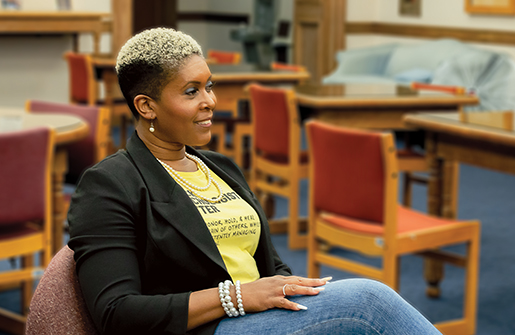
It’s common for psychologists and therapists to advertise their services on directories like Psychology Today. But Dr. Jessica Smedley (PsyD ’15), who owns a private practice and consulting company in Washington DC, chooses to only advertise on Therapy for Black Girls. “I really support their mission,” she says, which is to provide resources and therapeutic spaces to aid Black women and girls in tending to their mental health, a focus of Jessica’s work as well.
“Black girls tend to have a specific social and emotional experience based on racial and/or ethnic backgrounds,” Jessica writes on her blog, Dr. Jess on Black Stress. “Black women are powerful and resilient beyond measure but also need space to process emotions, pain, insecurities, and other vulnerabilities.” She adds that many of the issues Black women and men face have been passed down through generations, and oftentimes it takes a Black therapist or psychologist to help navigate the complexities of the Black experience and generational or racial trauma.
Jessica had only just started her own independent practice when the pandemic hit, and shortly after, the murder of George Floyd added more grief, stress, and trauma to communities of color. “People were triggered and upset and sad about all the things happening in the news,” she remembers. “It felt like unending trauma.”
The history of Black trauma is immeasurable. . . . It is imperative that this current generation engage in deep, intentional self-care to discontinue this long line of trauma in our veins. Therapy, with a Black professional (or other humble, culturally competent therapist) who is well-versed in trauma in the Black experience, is a very intentional way of healing these patterns. It takes work and energy to break down the barriers of carrying the weight of the past and creating new family “rules” going forward. It may feel scary and unsettling to break away from the familiar way that family handles (or avoids) problems, but it is essential to give hope to the future generations.
—
from “The Weight of Generational Trauma” on the Dr. Jess on Black Stress blog
In her private practice, Jessica validates her clients’ experiences and trauma and points out the way they “inform literally everything, from our relationships, our work styles, and how we show up in the world, to our self-image, self-esteem, and how we cope with stress.” In her work with clients, she says, she tries to “emphasize the importance of tools and self-advocacy and having positive outlets, where historically we either didn’t have access, or it wasn’t a thing, or it was looked down upon.”

Joy Netanya Thompson (MAT ’12) is an editor and writer based in the Los Angeles area. Find more of her work at joynetanyathompson.com.

Karley Carrillo is a creative producer for Christian Assembly Church in Los Angeles and a freelance photographer. See more of her work at itsmekarley.com.
It’s common for psychologists and therapists to advertise their services on directories like Psychology Today. But Dr. Jessica Smedley (PsyD ’15), who owns a private practice and consulting company in Washington DC, chooses to only advertise on Therapy for Black Girls. “I really support their mission,” she says, which is to provide resources and therapeutic spaces to aid Black women and girls in tending to their mental health, a focus of Jessica’s work as well.
“Black girls tend to have a specific social and emotional experience based on racial and/or ethnic backgrounds,” Jessica writes on her blog, Dr. Jess on Black Stress. “Black women are powerful and resilient beyond measure but also need space to process emotions, pain, insecurities, and other vulnerabilities.” She adds that many of the issues Black women and men face have been passed down through generations, and oftentimes it takes a Black therapist or psychologist to help navigate the complexities of the Black experience and generational or racial trauma.
Jessica had only just started her own independent practice when the pandemic hit, and shortly after, the murder of George Floyd added more grief, stress, and trauma to communities of color. “People were triggered and upset and sad about all the things happening in the news,” she remembers. “It felt like unending trauma.”
The history of Black trauma is immeasurable. . . . It is imperative that this current generation engage in deep, intentional self-care to discontinue this long line of trauma in our veins. Therapy, with a Black professional (or other humble, culturally competent therapist) who is well-versed in trauma in the Black experience, is a very intentional way of healing these patterns. It takes work and energy to break down the barriers of carrying the weight of the past and creating new family “rules” going forward. It may feel scary and unsettling to break away from the familiar way that family handles (or avoids) problems, but it is essential to give hope to the future generations.
—
from “The Weight of Generational Trauma” on the Dr. Jess on Black Stress blog
In her private practice, Jessica validates her clients’ experiences and trauma and points out the way they “inform literally everything, from our relationships, our work styles, and how we show up in the world, to our self-image, self-esteem, and how we cope with stress.” In her work with clients, she says, she tries to “emphasize the importance of tools and self-advocacy and having positive outlets, where historically we either didn’t have access, or it wasn’t a thing, or it was looked down upon.”
Joy Netanya Thompson (MAT ’12) is an editor and writer based in the Los Angeles area. Find more of her work at joynetanyathompson.com.
Karley Carrillo is a creative producer for Christian Assembly Church in Los Angeles and a freelance photographer. See more of her work at itsmekarley.com.


Over time, she helps her clients to understand their own thought processes that may be “unintentionally harmful or filled with doubt because of not being able to advocate for themselves during childhood.” She teaches them the skills they need “to set boundaries, to say no, to figure out healthier routines that reduce the feeling that you have to always wear the cape and be the savior for your family—I see a lot of that,” she says. She knows their joint work is paying off when clients come in and share things like, “Wow, I never thought that journaling would help me know how I feel and what I want to do to address it,” or “It felt really good to set a boundary and not feel bad about it,” or “I really am gaining a better understanding of what it feels like to make myself and my needs more of a priority.”
“At the end of the day,” says Jessica, “it’s really about trying to instill the importance of unapologetic self-advocacy” in
her clients.
As Black people, we have been socialized to not only try and stay safe, but to generally keep white people comfortable. Self-care for Black people requires pushing the envelope as we must challenge ourselves to speak up and place our emotions, needs, and boundaries into the atmosphere, without worrying what others will think. We must challenge past generational patterns of not speaking up and sweeping hard topics under the rug. We must learn that it is okay to take the well-earned time off that we have earned on our jobs. We must learn to first be attuned to our bodies to know that we need more sleep, stretching, or exercise. Black people have a long history of “pushing through” or being in “superwoman/man” mode, only to overlook chronic illness, jeopardize relationships, or have unrealistic expectations of themselves. In all instances, we must challenge
ourselves to acknowledge our humanity and go deeper with our self-care efforts.—
from “Unapologetic Self-Care” on the Dr. Jess on Black Stress blog
As a Black woman, Jessica believes she can create a safe space in the virtual therapy room for her Black clients. For sale in her website’s merchandise section are T-shirts, hoodies, and pillows bearing the slogans “Black Therapists Matter” or “Black Psychologists Matter,” highlighting Jessica’s philosophy that Black therapists can uniquely offer a sense of safety for their Black clients.
For her own practice, Jessica says, “I think that my clients feel that the therapy room is a space where there is no judgment, where they don’t have to be filtered.” She can also provide cultural safety for her clients, where “a lot of times pop culture comes up or maybe a joke or a saying within the Black community.” That common background, Jessica says, hopefully leads to clients feeling like “they can bring their whole selves into the virtual therapy room.”
She has also used her experience and background, along with her research that started when she was a student at Fuller working in Dr. Cynthia Eriksson’s trauma-focused research lab, to create resources for Black individuals and groups to use outside of therapy. Jessica has created three guided journals—Dear Black Girl: Essential Guided Reflections to Celebrate You; Reclaiming Our Space: A Devotional Journal for the Black Woman of Faith; and Reflect, Process, Heal: A Guided Journal to Explore Generational Trauma—and she recently coauthored Before the Broom: A Premarital Workbook for Dating, Engaged, and Newly Married African-American Couples.


Making such resources available outside of a traditional therapy relationship is important to Jessica because, as she notes, “access still feels like such a huge issue; it feels like a barrier.” One of the reasons for that is how insurance often doesn’t cover or only partially covers therapy. She also points out that communities of color are less likely to have quality health insurance. For her part, Jessica makes a point to take insurance. She says, “Many people can’t afford a $200 therapy session. Some can, which is fine, but many can’t. So if I really want to give access to people who look like me, I have to be paneled with at least one of the major health insurance options in my area.” Additionally, she has written a practical, step-by-step guide for finding a therapist, titled “Therapist Shopping While Black,” on her blog.
Jessica also thinks about access for Black people who desire to enter the field of psychology, pointing out that only four to five percent of psychologists are Black. “In the community environment where I grew up, I didn’t really know therapy was a thing until much later, around college,” she shares. “Just looking at the history of access to higher education in addition to the stigma around mental health in Black communities, and the field of psychology not being something that’s encouraged at younger ages in urban neighborhoods . . . that is another barrier on the professional side that impacts access to treatment for communities of color.”
Jessica says she keeps these barriers and issues of access in the back of her mind as she forges ahead in her career as a psychologist, as well as in her adjunct teaching position in the counseling psychology PhD program at Howard University. She’s also recently taken on leadership roles where she can make meaningful changes at a higher level, serving as the newly elected president of the DC Psychological Association for 2024, and the appointed chair of the Advocacy Coordinating Committee for the American Psychological Association (APA) for 2024. “It’s humbling,” she says of her leadership roles and representing her peers in the field. “It’s a powerful experience, and feels like I’m making an impact and giving back to the field in an important way.”
Less than a decade into her career as a psychologist, Jessica Smedley has already been making great strides in providing therapy and resources to the Black community with her particular blend of compassion, clinical expertise, and cultural insights. When asked what she wants her legacy to be, she pauses and thinks for a while before sharing, “I want people to say that Dr. Smedley was known for her faith, for her heart for people, and for wanting the Black community to feel more liberated, empowered, and whole.”
She’s well on her way.
Drawing from his own testimony of encountering God’s transforming hope in prison, Jarret Keith engages in the crucial work of reentry discipleship and ministry to the incarcerated church.